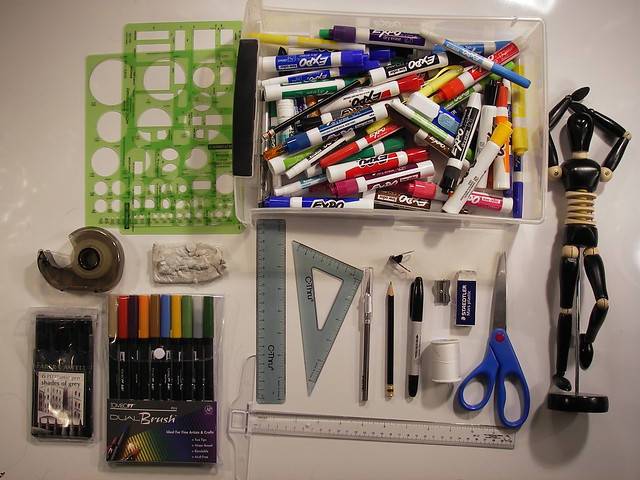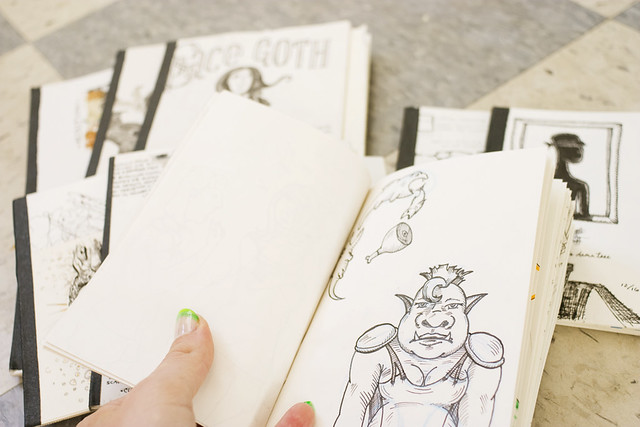Concept art is the dream job of many, and is one of the most competitive positions within the art discipline of the games industry. Learn the tools you'll need, the resources you'll find useful, and the strategies to put in the deliberate work.

This article is cross-posted from The Game Prodigy, a site for students and parents interested in careers in games. Visit for resources and a free 29-page Complete Toolkit.
"Expedition" by Greg Semkow
How can you develop the world-class skills required to become a game concept artist?
Concept art is the dream job of many, and is one of the most competitive positions within the art discipline of the games industry. These artists are responsible for working with the rest of the team to bring to life the images and ideas that will make up the game. What will it look like? How will this world feel? Is it dark and stormy like Resident Evil, or bright and whimsical like Super Mario? What about the people who live in this world?
To have a job of this caliber requires world-class skill and talent. And any of the concept artists I've worked with will tell you that talent doesn't come cheap; it's the result of months and years of hard work.
So if you want to be a concept artist, how can you fast track your skills? What are the techniques and road maps to get you up to speed and imagining worlds at the tip of your stylus?
Let's dive in!
Get Your Gear

A concept artist needs their tools, physical and digital. A game studio needs a concept artist to join and fit right in with the software the rest of the team is used to, and this means having experience with those tools.
To begin your skills, you'll need your physical tool set, most of which can be found at any hobby or craft store:
Pencil - 3B recommended for versatility of lights and darks
Pencil Sharpener - Keep them ready for action!
Plastic Eraser - Used to correct mistakes
Putty Eraser - This can be used not to undo mistakes, but to blend and shape gray shades on your paper
Ruler - A simple ruler is essential for straight lines and perspective drawing
Copy Paper - Nothing special, but great for work at your desk
Sketchbook - For sketching and drawing on the go
To practice digital work (what's commonly called just "painting"), you'll need your digital equipment:
Personal Computer or Mac - If you're reading this, I assume you have this one covered
Wacom Tablet - The industry standard for digital styluses. Studios will have larger tablets but you can get by with a small one. Worth saving up money for. Studica is a great site that can provide deep discounts for students and teachers if you're strapped for cash
Adobe Photoshop - The fact that Photoshop has become a verb ("That picture is photoshopped") should be proof enough that this is the industry standard in image manipulation. Again, Studica can help make it much more affordable
Adobe Illustrator (Optional) - For doing web, Flash, Facebook, or some mobile titles, Illustrator can be a good companion skill set for doing vector-based art. Don't feel the need to buy all these at once, but you'll probably want to pick up a copy of Illustrator eventually
For those short on money and starting from zero, you can more or less take this list in order as you develop your skills.
Once you have all your equipment, it's time to start learning how to put it to use by meeting the masters.
Immerse Yourself in Concept Art

"Desolated" by Greg Semkow
The best concept artists didn't get there in a isolation, sitting in their basements penciling away. The professional artists that work in the games industry stand on the shoulders of the artists who came before them, the classical artists like Michelangelo, Hals, or Durer as well as artists who have worked in the industry in decades past.
Learning from them is the best way to avoid reinventing the wheel.

The first way to immerse yourself is to simply look at what other concept art is out there. ImagineFX is a fantastic magazine publication that focuses on Fantasy and Sci Fi digital painting. You can check out their website and also pick up a copy of their latest issue at your local book store. While you're there, check out books on digital painting in the art and illustration section.
ConceptArt.org is another great site where artists from all over the world as well as games, film, and more can post their art and get constructive feedback. The art in this post is from the talented artists that share their work on that site. Digital Artist Daily is another site that has great tutorials along with sharing and showcasing other artist's work.
Looking at all of these sites is beneficial now only because it is inspiring, but it also helps to give you an understanding of where the quality bar is. All the other artists on these sites are competing for the same jobs that you are. They are all out there with their portfolios, sending them in to the same game studio hiring managers who are going to be looking at your portfolios one day. So while it may be intimidating at first, understand that over time this art is the level that you need to be able to hit. And you can do it with practice.
Once you've started to familiarize yourself with the concept art that's out there, hop off the bench and get involved in the game! Join the ConceptArt.org community and start giving feedback on others' work. Put up your own work for criticism and be ready to learn. Other sites like deviantART, CG Society, and GCHub, are great for making friends and learning from colleagues.
As long as you keep an open mind and area ready to learn as much as you can, you'll get a lot out of online websites, books, and magazines. Game concept art is an amazing talent, and associating yourself with others who have that talent is a surefire way to put you on the path to your first game job.
Deliberate Practice

Photo credit: CaZaTo Ma
But having the tools and getting involved in communities won't get you there along. The most important part to becoming a professsional game concept artist is deliberate practice.
You have to be willing to put in the hours it takes to be truly great.
Many students underestimate the level of preparation that's required for professional game art. A good rule of thumb to just go from knowing nothing to being a beginner is 20 hours of practice a week for 6 months. That's just to get started. Mastery of characters, environments, anatomy, lighting, and more will require much more practice.
A concept artist needs to have a deep understanding of human anatomy: musculature, skeletal structure, skin and hair and folds. A game artist needs to be able to visualize 3D space and understanding how lighting bounces around in a scene. Being able to depict weight and movement and perspective are all key.
Breaking up your practice into different areas of focus is a great way to stay motivated and stay learning. Take some of these topics and focus on them. One artist that I've worked with decided she wanted to become world-class with faces, and so she spent weeks looking at herself in the mirror, making faces at herself and trying to draw them. And it shows in her work! Her characters are amazingly expressive, from grand villains who are up to no good to the sidekick who is looking for his big break.

Photo credit: B_Zedan
Keeping your sketchbook with you at all times is another good way to get in your hours. When you're waiting for the train or sitting on a park bench, whip it out and start drawing what you see around you. Being able to draw from real life is the foundation of being able to draw imagined scenes in your mind. Some artists recommend having two separate notebooks: one for real life and one for imaginary works.
There are also plenty of great free lessons online that are focused on developing art and illustration skills. Youtube is a wellspring for this sort of thing: be sure to check out the FZD School of Design. Another great site is Digital Art Secrets, which has tutorials about a variety of photo and concept type projects.
Lastly, get to know your favorite artist's work intimately by copying them. Yes, copying.
But wait a minute: isn't copying bad? While you certainly never want to pass someone's work off on your own or plagiarize, looking at a talented artist's work and recreating it as closely as possible can help you get inside the head of another game concept artist. Notice how they layer their colors, what shapes they use, and how they structure their scenes. Try to internalize as much as possible.
Set Your Goal and Then Run For It!
If you want to become a concept artist in the games industry, to work alongside the artists at Blizzard, Rockstar, Activision, or other great companies, then the only thing holding you back is your own skill. Make the commitment to learn and you'll be on your way to applying in no time.
This article is cross-posted from The Game Prodigy, a site for students and parents interested in careers in games. Visit for resources and a free 29-page Complete Toolkit.
Read more about:
BlogsAbout the Author(s)
You May Also Like








